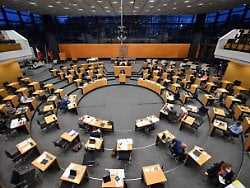Two years of minority government
Thuringia’s politics remain in “limbo”
02/05/2022 06:07 am
It was initially considered a temporary political project: after the FDP politician Kemmerich broke a taboo, a minority government was formed in Thuringia. Ramelow’s red-red-green coalition has now been in power for two years and has to consult the opposition for every decision.
Government as a permanent compromise: Bodo Ramelow’s red-red-green government in Thuringia has been missing four votes in the state parliament – for almost two years. It is neither tolerated nor tolerated, a rather unusual political construct in the history of the federal states. All decisions are a matter of negotiation with the opposition CDU, which provided the prime minister in Thuringia for decades before Ramelow and is now a reform party.
The political dilemma began with a taboo being broken on February 5, 2020, when the FDP politician Thomas Kemmerich was elected prime minister with the help of the AfD. The incident made waves nationwide, there were even demonstrations because the AfD tricked the Thuringian parliament with a pseudo-candidate in order to finally elect Kemmerich. After public pressure, he resigned three days later. On March 4, left-wing politician Ramelow became Prime Minister for the second time after 2014. Left, SPD, Greens and the CDU promised early elections, but the necessary dissolution of the state parliament did not take place in the summer of 2021 – the necessary two-thirds majority remained uncertain.
Now there is another tricky decision for red-red-green – the budget for 2022 is to be decided in the state parliament at the end of this week. A months-long tug of war preceded it. Finally, a regulation was negotiated that hurts the minority coalition.
Government crisis becomes parliamentary crisis
The CDU condemned the government to save 330 million euros in planned spending over the course of the year. “This is the worst way to consolidate a budget,” groaned Left Party leader Steffen Dittes. It is not the parliament that decides where the cuts should be made, but the Ramelow government. There is talk behind closed doors of an “enormous potential for blackmail” that the red-red-green must deal with. The parliamentary group leader of the Greens, Astrid Rothe-Beinlich, speaks diplomatically of “compromises that were difficult for us”. SPD parliamentary group leader Matthias Hey tries to make a comparison to illustrate the situation: Politics in Thuringia is like maintaining an apartment for which you can pay the rent and operating costs, but for which “an urgently needed renovation is not possible”. Hey speaks of a “limbo”. And this could last longer.
What was designed as a temporary political project seems to be developing into a long-term experiment until the next regular state election in 2024. A parliamentary crisis took the place of the government crisis.
Hey says the situation is “paralyzing”, decisions in parliament are now taking longer, and sometimes they don’t happen at all. In the education sector alone, there are often worlds between the ideas of Red-Red-Green and the CDU. A fundamental change in teacher training, as desired by the Left, SPD and Greens, has already been called off. While the Thuringian state parliament passed 49 bills in 2019, there were 30 in 2020 and only 26 last year.
“Little room for manoeuvre, hardly any major reforms”
Representatives of the Thuringian Left like to argue that minority governments are established and working well in other countries – such as Sweden. The Erfurt political scientist André Brodocz, on the other hand, points to differences. “I believe that our political culture, with its stronger juxtaposition of government and opposition, is a little less well suited to such forms of government,” says Brodocz. In Thuringia it is evident that decision-making processes are becoming slower and the government’s scope for action is becoming smaller.
Left parliamentary group leader Dittes sees the upcoming budget decision as proof that parliament and government are able to work despite all the difficulties. Brodocz admits that he didn’t think it would work at all. The price is: “Little room for maneuver, hardly any major reforms.” And Prime Minister Ramelow? He has been less present than before for a few months. The reason: Ramelow is President of the Federal Council for a year – a task that also involves mediating between the political camps and the interests of the federal states in western and eastern Germany. His credo: “Overcome what divides you”.
